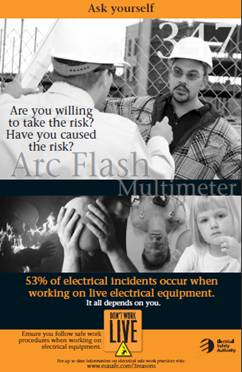Electrical Worker Safety - Are You Willing to Take the Risk?

53% of electrical incidents causing injury are from working on live electrical equipment. Between 1998 and 2006, 39% of critical injuries involved burns from an arc. Canada’s Electrical Safety Authority is encouraging electrical trades, and workers who do Electrical work to disconnect before working on electric panels and other equipment.
Electrical Worker Safety
Learn to identify the risks, know your rights, and think about the reasons.
In November 2008 Canada’s Ministry of Labour reported that 69 workers had been killed, 263 critically injured and 844 sustained minor injuries as a result of electrical hazards from 1998 to 2008.
Investigations have confirmed that 53% of events causing incidents are directly linked to working on energized equipment including:
- Installing and/or replacing breakers in panels;
- Installing and/pr working on wiring in a panel or motor control centre
- Working on 347 volt lighting systems
There is no acceptable rate of electrical injury to workers, especially when you consider that 74% of the probable causes of occupational electrocutions over this period were associated with improper procedure and human error.
With the support of the electrical industry and safety associations a “Just Don’t Ask” Authorization Form has been created to support electrical workers in educating clients and supervisors on the risks involved in doing live electrical work and the requirement to follow safe work practices.
Research indicates that 90% of electricians believe that additional information on electrical safety and safety work practices can support the reduction of electrical incidents.
These campaigns and materials are designed to caution electrical workers about safe work practice requirements in high-risk areas. They are designed to make workers think twice before taking risks, and to ensure that supervisors understand the risk that workers are taking. The components available through these campaigns can be used at health and safety meetings, to support the identification of safety training requirements, to caution workers, to notify supervisors and business owners and to reduce electrical incidents.
Click here for ESA’s Don’t Work Live Website and Safety Brochures and Posters: